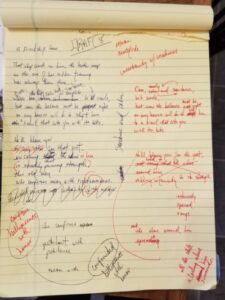“The mysteries of artistic creation are such that even the artist may have only the foggiest notion of what the work is aiming to be. A poem ends up on the page. But it’s not an utterance like a message or a telegram. In this respect, every poem is susceptible to Prufrock’s refrain, “That is not what I meant at all.”
What The Thunder Said: How The Waste Land Made Poetry Modern by Jed Rasula: pages 224-225
If I could go back, I would change the way I taught poetry to 36 years’ worth of students.
I was educated in the New Critical Method which emphasized that a text could be read in terms of evidence, and by evidence, meanings unveiled. I tried not to be dogmatic about this. I used the word ‘suggested’ often and ‘ambiguity’, but there is much that I missed. I do not think I ever found the key to teaching it so that my students might grow to love it. I believed in explication and ‘understanding’, not in how a poem arises and what the process of creation might have shown them.
I have been writing poetry since 2015. I took it up because my essays felt limited in subject matter and in describing the in-between state of composition where an image alone can tap into intuition, trace memories, and associations.
Since 2015, I’ve written over 500 poems. Most have been and are ultimately abandoned as not being just right – untruthful or clumsy or inexact or sentimental or beyond fixing.
I have discovered this about poems:
I don’t know where they come from. I’ll have a flash of memory, or a line comes to me, or I’ll sit down and free associate on paper and a word will appear, usually a noun, and that triggers a phrase, brings back a face, jolts me with an emotion. Then I’m off in pursuit to see where it might lead me.
I do not know where it will lead me. There is nothing programmatic about it. I never plot out a sermon. I run away from didacticism. I write to find out what I don’t know. Therefore, my better poems always have a discovery in them, something I never knew before the poem came into existence.
Revisions go on until I publish the poem for others to see. In revision, the poem is sharpened, and sometimes startling reversals occur because a discovery occurs, a revelation, something true appears. Notice the passive voice in that last clause? This is the mystery.
Mystery is the central element of the process of writing a poem. Because I never know exactly what I am after, I never know how it will take its final shape. I am not suggesting that I hear a voice or that a poem feels as if it is being dictated. I have not grown mad in writing them. Poems acquire a final shape through so many conscious moves involving choices of words, patterns, rhythms, line cuts, etc. That makes sense, yes? But something powerful is working behind that scrim of rational editing toward a measure of truth, and the poet knows if that truth is real or if it is false. That doesn’t mean that a false note can’t come through. There is no infallibility in these choices but a reaching after something true. Sometimes that ‘reaching after’ is too eager and a poem that should have been cut instead appears. I do not know what happens in that moment of ‘reaching after’. That is what helps to give great poems an edge of the mystical.
I wish I had told my students about these other conditions of a poem and how the circumstances of creation itself can inform its reading.
